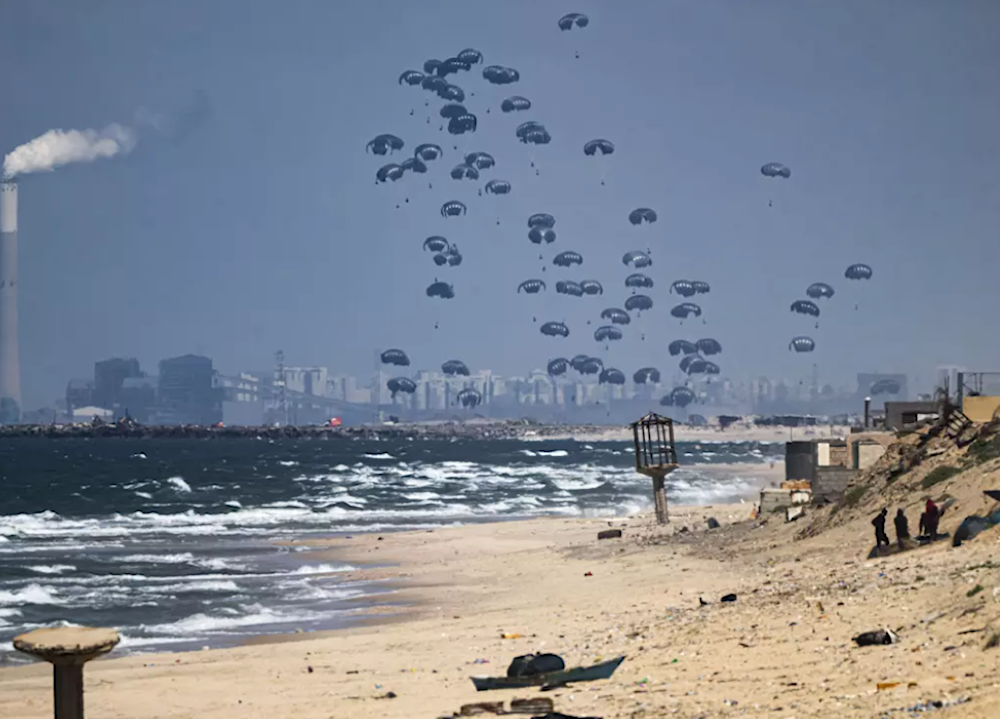Hamas, UN demand aid via land crossings after 12 Palestinians drowned
A man on the beach told Reuters that one Palestinian was swimming to get food for his children when he drowned.
-

An aircraft airdrops humanitarian aid over the northern Gaza Strip, as seen from central Gaza, Monday, March 25, 2024. (AP)
Twelve Palestinians have drowned while attempting to collect aid dropped by plane off a Gaza beach, Palestinian health officials reported on Tuesday, amid rising worries of starvation almost six months into the Israeli war on Gaza.
Reuters received footage of the airdrop, which showed crowds rushing toward the beach in Beit Lahia, north Gaza, while boxes with parachutes floated down, followed by people knee-deep in water and bodies being hauled onto the sand.
Following the tragedy, Hamas, in a statement, called for "an immediate end to airdrop operations" and "the immediate and rapid opening of land crossings to allow humanitarian aid to reach our Palestinian people."
UNICEF said vastly more aid must be rushed into Gaza by road, rather than air or sea, to avert "this imminent famine."
Food aid is usually only airdropped in crises where "people are cut off for hundreds of kilometers," said UNICEF spokesman James Elder, speaking via video link from Gaza.
But "the lifesaving aid they need is a matter of kilometers away", he said, as trucks loaded with aid have been waiting across Gaza's southern border with Egypt.
"We need to use the road networks."
This is the most recent in a series of instances, apart from deliberate Israeli shooting, involving deaths while Gazans attempt to reach aid in the tiny, cramped area where some residents forage for plants and bake barely edible bread from animal feed to survive.
Footage showed the corpse of a bearded young man being dragged onto the beach, his eyes open but still, and another man attempting to resuscitate him with chest compressions while someone muttered, "It's over."
Martyred retrieving food for their children
A man standing on the beach told Reuters, "He swam to get food for his children and he was martyred."
"They should deliver aid through the (overland) crossings. Why are they doing this to us?"
Aid groups estimate only about a fifth of the supplies needed are entering Gaza as "Israel" continues its air and ground onslaught, which has so far killed over 32,000 Palestinians and injured over 74,694.
They argue that delivery by air or sea directly to Gaza beaches is no replacement for additional supplies arriving by land via "Israel" or Egypt.
Meanwhile, the Israeli occupation forces continue to assassinate members of the clan committees that provide assistance to the people of Gaza for their refusal to cooperate with the Israeli regime.
The Supreme Council for Palestinian Clan Affairs said that the IOF assassinated several clan committee members at the Kuwaiti Roundabout while they were waiting to receive humanitarian aid to organize its distribution to hunger-stricken civilians in the northern Gaza Strip.
The assassinations "express the extent of the fascist occupation's anger toward Palestine and also express the extent of its helplessness and failure to undermine the unity of the Palestinian internal front."
Aid airdrops to Gaza, more of a show than genuine humanitarian act
The Government Media Office in Gaza recently called for the immediate and urgent opening of land crossings to allow thousands of tons of aid to enter, to prevent the deepening famine crisis in the Gaza Strip, especially in the north.
Commenting on the casualties resulting from the random air drops of aid, which led to the killing of 5 people and injury of several others, the office reiterated that such operations are not effective and are not the optimal way to deliver aid.
Several Palestinians have been killed in aid airdrop mishaps, where at least one parachute malfunctioned, causing a package to fall on them.
The UN aid coordinator for the Gaza Strip emphasized after a closed-door Security Council meeting that delivering humanitarian supplies to Gaza by airdrops or sea cannot sufficiently substitute land deliveries.
Sigrid Kaag said her message to the UN Security Council was that the international community must "flood the market in Gaza with humanitarian goods" and "re-energize the private sector" so that more commercial goods can enter to meet civilians' needs.
"The diversification of the supply routes via land" remains the optimal solution, she stressed.
"It's easier, it's faster, it's cheaper, particularly if we know that we need to sustain humanitarian assistance to Gazans for a long period of time."
Asked about the main obstacles to delivering aid to the people of Gaza, Kaag pointed to the complicated border inspection process by the Israeli occupation forces.
"If everything goes through one or two crossings, it's harder to process. Verification checking takes time. There are cumbersome processes," she said.

 5 Min Read
5 Min Read










